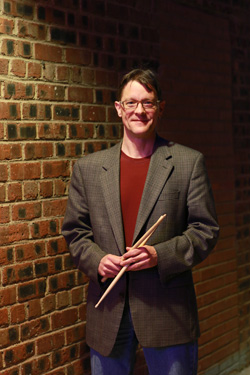A Mood in Jazz
On stage or in class, Joey Carter fills the room with melodies and rhythm.

Getty images © mustafahacalaki
A Mood in Jazz
On stage or in class, Joey Carter fills the room with melodies and rhythm.
For Joseph “Joey” Carter ’00 MM, music mentorship requires sharing the passion and frustration only a veteran musician understands. Carter plays gigs five to seven nights a week in restaurants, concert halls and smoky clubs, doing everything from solo jazz piano to Middle Eastern percussion.
In a lifetime of playing music, the multiple instrumentalist has made music any way he could, including hitting the world’s jazz festival circuit and designing a soundtrack for the Spy Kids movie franchise. The lure of melodies and rhythms beckons daily, said Carter, instructor in percussion, music theory and jazz studies at the School of Music. “I’m kind of obsessed.”
Carter debuted on the public stage at age 9, playing drums and percussion with his father’s high-society variety band. “In many ways, it totally defined who I was,” Carter said. “I was much more comfortable onstage oftentimes than I was off.”

Joseph “Joey” Carter ’00 MM discovered an affinity for the permutations of jazz as a young musician. Photo by Carolyn Cruz
His father, Rusty, went on to open a vintage instrument and repair shop in North Texas. Carter turned to rock and blues bands before studying music at the University of Texas at Arlington, where he learned piano because a jazz ensemble needed nimble and willing hands.
Knowing that most musicians needed alternate income streams, Carter developed a career in music education at high schools and community colleges. A flexible teaching schedule opened his nights for gigs.
Jazz strikes a chord
As a young musician, Carter discovered an affinity for the permutations of jazz, loving its improvisational nature. “It’s very liberating. You have to be in the moment. You can’t think too far ahead or think about what just happened,” he said. “You get into the flow, and you’re always listening more than you’re thinking.”
Almost 20 years after his professional debut, Carter realized he needed to devote more attention to instrumental fundamentals and nuances if he wanted to continue improving as a musician. “The right notes are the first part of the picture, but then you have to shape them into ideas.”
An encounter with former TCU jazz band director Curt Wilson led Carter to earn a master of music degree in percussion performance at TCU in 2000. He remained at the university to teach music theory, ear training, jazz history, jazz ensemble, jazz improvisation and private lessons in percussion and piano.
“It’s very liberating. You have to be in the moment. You can’t think too far ahead or think about what just happened. You get into the flow, and you’re always listening more than you’re thinking.”
Joey Carter
An ear for composition
The popularity of jazz swelled in Fort Worth around the turn of the millennium after simmering since jazz legend Ornette Coleman left town in the late 1940s.
At the time, a downtown bar started hosting a weekly jazz jam. Carter showed up with a vibraphone, a metallic keyboard with spinning wheels inside long tubes. Performing with bassist Aden Bubeck and drummer Rich Stitzel, he became the backbone of the free-form sessions. (Nowadays Bubeck plays with country music star Miranda Lambert, and Stitzel lives in Chicago.)
The three musicians clicked and, with guitarist Paul Metzger, formed Bertha Coolidge, a progressive jazz-fusion group. Although Carter penned a few solo tunes and did original compositional arrangement earlier, the Bertha alchemy launched him into the status of professional composer.
Having performed thousands of pieces of music, Carter found a new level of artistry in composition. “A lot of it is being able to realize what you hear in your mind,” he said. “It’s like playing, only slowed down a little bit.”
Bertha Coolidge’s first album, Live at the Caravan of Dreams 030201, featuring six of Carter’s compositions, won the Fort Worth Weekly’s Album of the Year award in 2002.
Working with band members who understood the musician’s intention as a writer helped the process — another experience Carter could leverage with students. “I’m always thinking about what happened last night at the gig and how that matters to what we’re doing in class.”
Carter advises students to cultivate a devotion to practice, unshakable attention to detail and a willingness to refine everything. “The more you begin to master [music], the more you realize you’re not there yet.”
As for students following his footsteps as a professional musician, Carter is encouraging but realistic. “It’s not easy because you never finish,” he said. “The goal is always to get better, and that’s a very ambiguous goal that constantly moves away from you.”

Your comments are welcome
Comments
Related reading:
Campus News: Alma Matters
The True King of Swing
TCU writing instructor Cynthia Shearer sets the record straight on Fletcher Henderson.
Features
Our Marching Band, the Pride of TCU
In its 111th year, the band still practices hard, relies on teamwork and performs with passion.